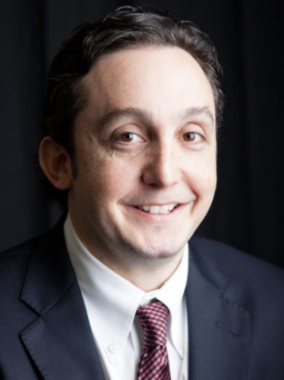Expert Voices: Deep Brain Stimulation for People With Parkinson’s Disease
Written by |

In this installment of our “Expert Voices” series, Parkinson’s News Today asked neurologist Michael S. Okun, MD, to answer some of your questions about deep brain stimulation (DBS).
Michael S. Okun is chair of neurology, professor, and director of the Norman Fixel Institute for Neurological Diseases at the University of Florida Health College of Medicine. The UF institute he co-founded with Kelly D. Foote, MD, is a one-stop patient-centered clinical-research experience for national and international patients seeking care. Dr. Okun has served as the national medical director/adviser for the Parkinson’s Foundation since 2006.
His research has been wide-ranging, and he is best known for his exploration and innovation in neuromodulation and deep brain stimulation. He has published more than 400 peer-reviewed articles, and his book “Parkinson’s Treatment: 10 Secrets to a Happier Life” was translated into more than 20 languages. His most recent books are “Ending Parkinson’s Disease” and “Living with Parkinson’s Disease.” Okun was recognized in a 2015 White House ceremony by the Obama administration as a Champion of Change for Parkinson’s Disease.

Michael S. Okun, MD, has extensively researched and performed deep brain stimulation. (Photo courtesy of Dr. Michael S. Okun)
What makes a person a good candidate?
It turns out that DBS is not a simple yes or no selection process, like may be true for a gallbladder surgery, for example. If you have Parkinson’s disease and your quality of life is impacted by on-off fluctuations, dyskinesia, tremor, rigidity, or bradykinesia, despite aggressive attempts to adjust timing and dosages of medications, DBS should cross your mind.
The next step is referral to an experienced DBS center and a multidisciplinary evaluation, including on-off dopamine medication testing as well as appointments with a neurologist, a neurosurgeon, a psychiatrist, and a neuropsychologist. Rehabilitation specialists, social workers, and nutritionists may also be needed for an optimal DBS outcome. This group of specialists should talk behind your back to determine whether surgery is appropriate as well as discuss target and approaches.
What questions about or aspects of DBS do you wish more doctors and patients would discuss together when deciding whether the implant is right for a person?
I always ask patients to make a list of the symptoms that must get better to make the DBS surgery worth pursuing. I also list symptoms that would be a bonus if they did “get better.” This list should be discussed not only with me as the neurologist, but also the other members of the screening team.
What’s a healthy expectation of what DBS can help with for a person with Parkinson’s?
Once a person with Parkinson’s has undergone complete multidisciplinary screening, their expectations can be defined by the team. The next step is a surprise. The team gets together and talks behind their back. The best possible DBS care is when lots of professionals evaluate you and talk behind your back. Expectations can be discussed versus the experience of the team in achieving outcomes. The person with Parkinson’s and their family are then contacted with the results of the team meeting, which includes risks and benefits and addressing expectations.
Additionally, during DBS screening, the visits facilitate the discussion of expectations with each team member. This process we have found important. It is easy to discard one opinion — for example, DBS may not improve walking and balance. It is much harder to discount five or more opinions. Expectations of benefits in walking, talking, and thinking are the areas in which we see the greatest mismatches: for example, a person might desire improvement and experience favors the idea these symptoms will not improve.
How might DBS affect behavior or mood in people with Parkinson’s?
Behavior and mood has been an area of intense interest in our group since we conducted the NIH COMPARE DBS study many years ago. At an experienced center, if your DBS lead is optimally placed, many experts will share that mood, thinking and disease progression issues will have the greatest impact on outcome. We always monitor for suicidal ideation, apathy and demoralization. You can’t congratulate yourself as a clinician too quickly with DBS, as Parkinson’s is a chronic disease. Finally, if you have an anxiety disorder, bipolar disorder, or a history of severe depression, it is important you are monitored closely after DBS surgery.
What does DBS feel like when the device is on?
In an optimal situation, you set the DBS and forget it (once programming has been optimized). You should pay attention mostly to progression of Parkinson’s, medications, and therapies. The on-off fluctuations should smooth out, tremor and dyskinesia usually improve stiffness, and slowness may get better. It is hard to say what will improve as it depends on the list of issues going into the surgery.
How long does it take for DBS therapy to work after the implant procedure?
This is a tough question as dyskinesia and tremor may capture quickly. Other symptoms may take many months to optimize and, guess what, not everyone with DBS reduces medications. Medication reduction should not be the goal of therapy. In general, we dedicate six months to programming, medication optimization, and adding therapies.
What downsides to DBS might not often be considered?
There is an implanted device and it may get infected and have to be removed. Also, consider it is still brain surgery and the risk is not zero. Finally, once you have the device, it will need ongoing maintenance and management and this is not trivial.
Has any recent research about DBS excited you?
We are, of course, excited by research from our group and others including closed-loop adaptive DBS, changing shapes of DBS pulses, optogenetically guided DBS, and several other deep brain stimulation plus approaches.
What aspects of DBS need more research?
We are really at the beginning of the DBS revolution. We understand much of the biology and little about the mechanism of action. Unlock the DBS mysteries on circuit mechanism, and many more therapies will have the chance to mature.
Expert Voices is a monthly series involving a Q&A with an expert in the Parkinson’s space about a specific topic. These topics and questions are curated from a survey in which we ask readers what they want to learn more about from experts. If you’d like to submit topics or questions for consideration in a future installment of the series, click here to take the survey.
Parkinson’s News Today is strictly a news and information website about the disease. It does not provide medical advice, diagnosis, or treatment. This content is not intended to be a substitute for professional medical advice, diagnosis, or treatment. Always seek the advice of your physician or other qualified health provider with any questions you may have regarding a medical condition. Never disregard professional medical advice or delay in seeking it because of something you have read on this website.


